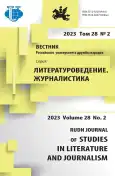«История Российского государства» Бориса Акунина - конспирологическая игра Г.Ш. Чхартишвили с читателями?
- Авторы: Елфимова М.Г.1
-
Учреждения:
- Московский государственный университет имени М.В. Ломоносова
- Выпуск: Том 28, № 2 (2023)
- Страницы: 228-236
- Раздел: Литературоведение
- URL: https://journal-vniispk.ru/2312-9220/article/view/318899
- DOI: https://doi.org/10.22363/2312-9220-2023-28-2-228-236
- EDN: https://elibrary.ru/OPRGYZ
- ID: 318899
Цитировать
Аннотация
Рассматривается вопрос о псевдонимах Г.Ш. Чхартишвили и их роли в его творчестве. Изложена история появления литературных масок писателя, представлена их краткая характеристика, дан общий анализ литературной деятельности Чхартишвили и эволюции его стиля. Проанализированы особенности использования различных образов, «примеряемых» писателем при создании основных произведений, обоснована необходимость обращения к псевдонимам. Основная часть исследования посвящена проблеме авторства в проекте «История Российского государства», а также объяснению мотивов, которыми руководствуется Г. Чхартишвили, публикуя историческое сочинение под псевдонимом Бориса Акунина. Приведена оценка писательского стиля Акунина, его умения трансформировать привычные жанры под запросы аудитории, времени, авторских задач и пр., проанализированы беллетристические тексты проекта. Представлены выводы о литературном образе Чхартишвили-Акунина как альтернативном герое, задействованном в создании исторического проекта. Данный факт позволяет говорить о том, что писатель в очередной раз демонстрирует свое умение перевоплощаться, трансформировать манеру письма, сюжетику и стилистику при работе над тем или иным художественным произведением.
Ключевые слова
Об авторах
Мария Геннадьевна Елфимова
Московский государственный университет имени М.В. Ломоносова
Автор, ответственный за переписку.
Email: mashaelfimova@mail.ru
ORCID iD: 0000-0001-6984-9406
аспирант, кафедра истории русской литературы, филологический факультет
Российская Федерация, 119991, Москва, Ленинские горы, д. 1Список литературы
- Akunin, B. (2021). The time of Nikolas II: After a lengthy illness. Moscow: AST Publ. (In Russ.)
- Akunun, B. (2013). Part of Europe. The History of the Russian state. From the Beginning to the Mongol Conquest. Moscow: AST Publ. (In Russ.)
- Arkhangelskaia, A.V. (2021). Boris Akunin’s genre experiments in the story Boh and Shelma. Bulletin of the Moscow Region State University. Series: History and Political Sciences, (4), 45-52. (In Russ.) http://doi.org/10.18384/2310-7278-2021-4-45-52
- Baraban, E.V. (2004). A country resembling Russia: The use of history in Boris Akunin's detective novels. Special Forum Issue: Innovation Through Iteration: Russian Popular Culture Today, 48(3), 396-420. https://doi.org/10.1515/9781618112231-040
- Baraban, E.V. (2021). The Akunin project: The mysteries and histories of Russia's bestselling author. University of Toronto Press.
- Bykov, D. (2007). Whoredom of work. Essay. St. Petersburg: Limbus Press, Izd-vo K. Tublina Publ. (In Russ.)
- Chernyak, M.A. (2015). The actual 21st centuries discourse: An invitation to dialogue. Moscow: Flinta Publ., Nauka Publ. (In Russ.)
- Desyatov, V.V., & Karpukhina, V.N. (2019). Metaphysics of a detective story (on the novel of Boris Akunin The Sennight of the Three-Eyed). The Siberian Journal of Philology, (1), 134-147. (In Russ.) http://doi.org/10.17223/18137083/66/12
- Gorski, B.A. (2018). Authors of success: Cultural capitalism and literary evolution in contemporary Russia (Doctoral dissertation) (pp. 38-83). Colombia University. https://doi.org/10.7916/D8RZ0JWS
- Kilfoy, D.J. (2007). When and where? Time and space in Boris Akunin’s Azazel and Turetskii Gambit (Master’s dissertation). Waterloo, Ontario.
- Osmukhina, O.Yu. (2009). The author’s mask in 1760-1830 Russian prose (Doctoral dissertation). Saransk. (In Russ.) https://doi.org/10.30853/filnauki.2020.7.8
- Osmukhina, O.Yu., & Karpov, A.D. (2020). Representation of history in History of the Russian State by Boris Akunin. Philology. Theory and Practice, 13(7), 41-46. (In Russ.)
- Pleshkova, O.I. (2016). Parodic transformation of genre traditions in B. Akunin’s story Boh and Shelma. The World of Science, Culture and Education, (6), 446-449. (In Russ.)
- Ranchin, A.M. (2004). B. Akunin’s novels and classical tradition: Narrative in four chapters with warning, lyrical digressions and epilogue. The New Literature Review, (3), 235-267. (In Russ.)
- Snigireva, T.A., & Snigirev, A.V. (2016). B. Akunin: Playing with a name (based on fictional accompaniments to The History of the Russian State. Ural Philological Bulletin. Series: Language. System. Personality: Linguistics of creativity, (2), 234-242. (In Russ.)
- Snigireva, T.A., Podchinenov, A.V., & Snigirev, A.V. (2015). Between a history and literature: B. Akunin’s author’s strategy in “The History of the Russian State”. Science Journal of Volgograd State University. Linguistics, (3), 162-170. (In Russ.) https://doi.org/10.15688/jvolsu2.2016.3.18.
- Tynianov, Yu.N. (1977). Poetics. The history of literature. Cinema (pp. 255-269). Moscow. (In Russ.)
Дополнительные файлы









